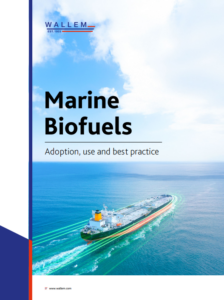20 May 2025 – Wallem Group, a leading global maritime partner, has published a new whitepaper to ensure ships, ships systems and crews are fully prepared to load, store and use biofuels in everyday vessel operations.

‘Marine Biofuels: Adoption, use, and best practice’ recognises the contribution that biofuels can make to maritime decarbonisation, while also offering comprehensive guidance on the precautions owners and crew need to consider before and during use.
Biofuels have established a market position among owners seeking to reduce greenhouse gas emissions at a time when alternatives such as Renewable Fuel of Biological Origin (RFNBO), zero-carbon hydrogen, ammonia, or e-methanol remain unavailable. Permissible biofuel well-to-wake emissions intensity has been defined by the International Maritime Organization (IMO) as at least 65% of Marine Gas Oil (MGO).
However, with a lower calorific value than fossil fuels, biofuels also present adoption challenges that require close attention from procurement, technical and vessel operating personnel, notes Abhijit Ghosh, Head of Maritime Technology and Innovation, Ship Management, Wallem Group.
The whitepaper examines the regulatory landscape surrounding marine biofuels, but also the specifics of IMO compliance, and the transparency needed to use fuels that vary batch to batch. It explains how these blends of Fatty Acid Methyl Ester (FAME) and residual or distillate fuels impact storage tanks, fuel systems, machinery, and crew training, also reflecting on the need for additional insurance cover.
Based on experience, Wallem has particular recommendations for owners on the assurances they need from equipment suppliers before introducing biofuels. It also explores the consequences for biofuel users of improper blending, acidity, biodegradation and microbial growth, fouling, waxing and clogging. The publication provides best practice recommendations for testing, materials selection, segregation, temperature control, tank cleaning and fuel line flushing. For long-term biofuel use, Wallem recommends that engines are retrofitted with hardened fuel pumps and corrosion-resistant coatings.
The whitepaper also considers crew training gaps and offers recommendations for monitoring, measuring, and checking biofuel use to ensure that personnel, systems, and the ship remain safe.
“The combination of a centralised digital system for real-time tracking and analysis of biofuel consumption and a skilled and well-trained crew can be transformative for enabling the future-ready maritime fleet”, says Ghosh.
To download Wallem’s White Paper ‘Marine Biofuels: Adoption, use, and best practice’ click HERE
About Wallem
Wallem Group is a leading provider of technology driven maritime solutions, offering services supporting the complete lifecycle of a vessel from newbuilding supervision to end-of-life recycling guidance. Wallem’s extensive portfolio includes asset management, crewing, training, ship management, safety and compliance management and agency services.
As one of the largest and most experienced solutions providers globally, Wallem offers world-class support to shipowners by bringing its customer-centric and transparent approach to all aspects of fleet operation. Wallem combines technology and forward-thinking to deliver on safety, technical, and commercial performance without compromise. Wallem believes in collaboration to foster innovation in meeting future needs.
Wallem operates globally with a shore-based team of 700 people and 5,000 highly qualified seafarers, serving nearly all vessel segments.
